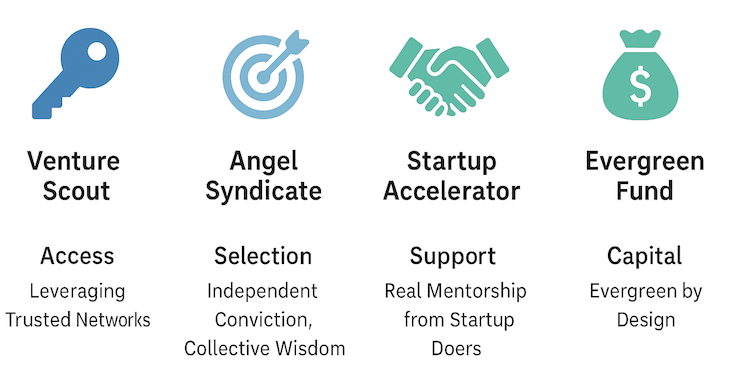The Transformation of Pre-seed and Seed Stage Investment
Arthur Rock, a 31-year-old Harvard Business School MBA graduate, and Wall Street investment banker, might not have imagined that his 1957 investment in Fairchild Semiconductor would be the starting point of Silicon Valley’s history. His subsequent investments in Intel and Apple earned him the title of a pioneer angel investor in Silicon Valley.
Pre-seed and seed stage funding, which refers to capital provided during a startup’s initial development phase, has traditionally been associated with angel investors—often characterized as the “3Fs”: Family, Friends, and Fools, implying that only these people are willing to bear the high risks of investing in such an early and uncertain stage.
In recent years, the pre-seed and seed stage landscape has bloomed and innovations such as Startup Accelerators, Venture Scouts, and Angel Syndicates have emerged. These innovations not only bring more capital to the game but also professionalize and institutionalize pre-seed and seed stage investments. It’s not just about the money either. More resources are thrown into helping startups grow.
Welcome to GPV
GPV (Good People Ventures) takes a fresh approach to pre-seed and seed stage investing. We keep things lean on the operations side and use a collaborative model for making investment decisions. Basically, we bring together a group of active angel investors, mostly founders, angels and startup operators themselves, who use their experience and resources to back new entrepreneurs. You can think of it as a blend of the best parts of Venture Scout, Angel syndicate, Startup Accelerator, and Evergreen Fund. Up next, I’ll break down GPV actually works.

Access – Leveraging Trusted Networks
Sequoia Capital pioneered the venture scout model to expand deal flow at the pre-seed and seed stages. Scouts, often experienced founders, angels, or startup operators, act as the VC’s “eyes and ears” in the ecosystem, spotting promising startups that might otherwise go unnoticed. This approach is cost-efficient since compensation is tied to successful investments rather than fixed salaries. At GPV, we take this model further. Our scouts not only source deals but also commit capital as LPs in the GPV fund. This dual role strengthens alignment and reduces potential conflicts of interest, ensuring our scouts are fully invested in the startups they bring to the table.
Selection – Independent Conviction, Collective Wisdom
Angel syndicates rely on a “lead angel” who sources and manages deals on behalf of the group. By contrast, VC firms generally make decisions through partnerships or investment committees, encouraging rigorous debate but also risking groupthink, the tendency to settle for safer, consensus-driven choices. This can be especially limiting in the pre-seed and seed stage, when the best ideas often appear unconventional or “crazy.” GPV takes a blended path. Our scouts can lead deals, much like syndicate leads, allowing for bold, independent bets. At the same time, the decisions are enriched by the perspectives of the broader scout network. This creates a balance between encouraging contrarian conviction and benefiting from collective feedback.
Support – Real Mentorship from Startup Doers
Since Y Combinator’s launch in 2005, accelerators have proven the value of structured mentorship, networks, and funding in helping startups grow and secure follow-on funding. GPV builds on this model, but with a crucial difference: our partners aren’t just mentors, they’re investors too. As founders, angels, and startup operators themselves, they bring practical experience and networks while having real skin in the game. Their mentorship is grounded in the realities of building and scaling startups, backed by the alignment of their own capital at work.
Capital – Evergreen by Design
Most VC funds operate on a fixed timeline of 7-10 years, forcing fund managers to exit investments on schedule rather than at the right time. That doesn’t fit the long journey of pre-seed and seed startups, which often need a decade or more to reach a liquidity event (IPO or acquisition). Evergreen funds, in contrast, operate without fixed lifespans, allowing fund managers to hold the winners longer, maximize returns, and focus more on portfolio support than constant fundraising. While rare at the pre-seed and seed stages, the evergreen model is well-suited to backing young startups with patience. At GPV, our evergreen structure puts LPs in the driver’s seat. As long as there are partners passionate about angel investing, GPV can continue supporting founders for the long haul.
“I invest in people, not ideas.”
Arthur Rock once said, “I invest in people, not ideas”. Looking back at the history of Fairchild Semiconductor, this Silicon Valley star of the 60s assembled some of the US’s most brilliant scientists of the time. Yet, due to the lack of equity incentives and excessive intervention from the investor, core members left rapidly, leading to a loss of technological advantage. Despite several restructures and M&A, the company never fully recovered. The Silicon Valley legend ended when Onsemi acquired it in 2016. Lesson learned: it’s all about the people.
GPV’s game plan is all about ‘people’ and ‘trust’. It will work as a lean pre-seed and seed stage investment machine when everyone involved in GPV – fund investors, scouts, and entrepreneurs – trusts each other.